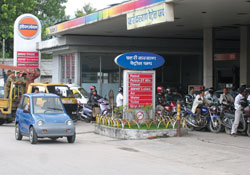|
|
In an ideal world, we would have a smart government. It would recognise our growing dependence on expensive imported fuel and give tax breaks for electric vehicles.
Nepal is going bankrupt subsidising fossil fuels, but still it tries its best not to allow vehicles that run on electricity. Fossil fuels don't just harm the ecology, they ruin the economy. The spectacularly mismanaged Nepal Oil Corporation (NOC) already owes Indian Oil Rs 10 billion, and this is growing at Rs 300 million a month. How on earth are we going to pay up?
After last weekend's riots, this government just doesn't have the stomach to push through another necessary price increase. So, the only sensible thing to do is look for urgent alternatives:
. Announce tax breaks to domestic manufacturers of electric vehicles
. Cut import duty on electric cars
. In the long term restart trolleys, cargo ropeways and trains 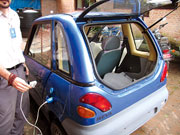 Successive governments in Singha Darbar have been too beholden to the fossil mafia to push electric. Officials are concerned that giving tax breaks to electric vehicles will cut government revenue from petrol and diesel cars.
Successive governments in Singha Darbar have been too beholden to the fossil mafia to push electric. Officials are concerned that giving tax breaks to electric vehicles will cut government revenue from petrol and diesel cars.
But calculations show that instead of losing money, the government could actually save in the long term though tax rebates on electric vehicles like the Reva, MiniEV and ElectroBus. Sale of hydroelectricity that would otherwise be wasted and savings on fuel subsidies alone would cover up the revenue loss over a car's ten-year lifespan.
Running costs of electric vehicles like the Reva are so low that even including battery replacement every three years, the total saving to a customer over a petrol car is a staggering
Rs 1,012,000 over ten years. That is when petrol prices are at the present Rs 67.25 per litre, so the savings would be even higher as petrol prices go up to Rs 80 per litre or more.
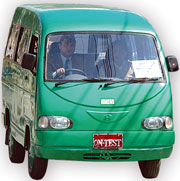 MiniEV
MiniEV
The fully-functioning MiniEV van made by Hulas in Biratnagar is undergoing road tests. It is as big as a Maruti van, comfortably seats seven plus the driver, can run for 70km on a full charge, and would cost the same as a Maruti but run for one-sixth of the cost. (See: 'Clean, green & electric', #290)
"While the rest of the world is into energy independence we in Nepal have a solution staring at us right in the face," says Megesh Tiwari of the Kathmandu Electric Vehicle Alliance (KEVA), which worked with Hulas on the MiniEV.
So what is Hulas waiting for? Customers. It just hasn't sunk in into the minds of vehicle owners in Nepal that the age of fossil fuel dinosaurs is over. Even if they don't become extinct very soon, they will be too expensive to run.
Safa tempos have shown that electric transport makes economic and environmental sense. Yet, even transport entrepreneurs already using electric vehicles are unwilling to make the jump from three wheels to four wheels. It's time they did.
Hulas Motors, Akash Golchha (01)4244254 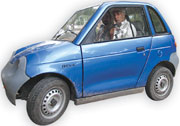 Reva-lution
Reva-lution
This cute car is ideal for Kathmandu's terrain, road width and distances. Manufactured in Bangalore under US license, the Reva is becoming a hit in Britain, Australia, and India.
And it can also be a head turner in Kathmandu, as we found out during a test drive this week. People waiting in long lines at the gas station walked over to ask: "Is this electric? How much does it cost? When will it be in the market?" But the government just isn't willing to reduce a cumulative 234 percent tax, even though in 1997 it was gazetted that EVs would have to pay only ten percent and VAT.
The Reva comfortably seats a driver and a passenger and can, if push comes to shove, squeeze in two more passengers at the back. It's a zippy little car that easily overtook the startled-looking driver of a Suzuki Ignis on the Pulchowk incline the other day.
In fact, the Reva is a traffic hazard because other drivers take their eyes off the road to admire this smart little thing. The Reva can run 90km on a full charge which means you can circle the Ring Road three times, if you'd ever want to do that. Or you can drive all the way to Pokhara and recharge it at Kurintar while you take a lunch break.
The Reva has a top speed of 65km/h and can be nearly fully charged at home by simply plugging the car to your 220v wall socket for three hours.
Eco-visions: [email protected] 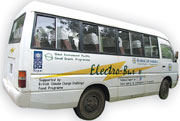 Safa bus
Safa bus
Safa tempos were a great idea: for ten years ago. Now, Kathmandu streets are so congested by slow-moving safas that although they themselves are zero emission they contribute to traffic snarls so other cars pollute even more.
Now we need to go for electric vans like the MiniEV for public transport on narrow streets, like this prototype Electro Bus II made by the Himalayan Light Foundation (pictured) that seats up to 25 tourists and 60 bus passengers. Like the MiniEV, the Electrobus also has an AC motor which gives it more of a punch.
"Because of the success of safa tempos, Nepalis have always thought electric cars are only three-wheelers. We have to change that mindset," says Bibek Chapagain of KEVA, which is working with Surendra Golchha at Hulas to promote the MiniEV.
Switching to electric buses would not just reduce the country's fuel bill and replace Indian-made buses with Nepal-assembled ones, it would also lessen pollution. But best of all, these buses will use off- peak hydropower that would otherwise be wasted. It's a win-win-win situation.
The government could change all that with one stroke of the pen, and reduce the tax on electric buses. Which transporter won't dump his diesel bus if he can run an electric one for one-sixth the cost?
Himalayan Light Foundation: (01)4418568
Win-win-win
| Reva cost Rs 658,000 | Rs 658,000 |
| Landed cost (includes 80 percent duty, 5 percent special tax. 13 percent VAT and 32 percent excise) | Rs 1,437,858 |
| Dealer margin, VAT and excise | Rs 105,000 |
| TOTAL PRESENT COST | Rs 1,545,093 |
| TOTAL COST if 1997 rebate is applied | Rs 817,000 |
| Savings to government over 10-year lifecycle of car from losses to NOC, and income to NEA from electricity sales (not including savings from reduction in health problems and losses to tourism caused by pollution): | Rs 800,000 |
| Savings to customer in running costs of Reva over 10 years compared to Maruti: | Rs 1,012,120 |
The Reva saga
In 2002, the Kathmandu-based company Eco-visions took advantage of a government decision to reduce taxes on electric vehicles by importing five Reva cars from Bangalore.
But once the cars reached Birganj customs Eco-visions was asked to pay the same tax as other cars. Despite intense lobbying finance ministry officials refused to follow their own rule that electric cars need pay only 10 percent tax and VAT.
"We tried to get them in cleanly, we refused to pay to play," recalled Jeevan Goff, co-founder of Eco-visions. So the vehicles rotted in the customs godown for four years until the company bought the cars back at an auction for scrap value recently. The five cars are now fully refurbished and are up for sale, good as new. The only trouble is the Reva is completely, and absurdly, unaffordable because of the nearly 240 percent tax.
Says Goff: "People should be burning tyres on the streets to demand a reduction in the tax of electric vehicles."

